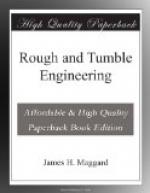SOME THINGS TO KNOW
Q. What is fire?
A. Fire is the rapid combustion or consuming of organic
matter.
Q. What is water? A. Water is a compound of oxygen and hydrogen. In weight 88 9-I0 parts oxygen to ii I-I0 hydrogen. It has its maximum density at 39 degrees Fahr., changes to steam at 2I2 degrees, and to ice at 32 degrees.
Q. What is smoke?
A. It is unconsumed carbon finely divided escaping
into
open air.
Q. Is excessive smoke a waste of fuel?
A. Yes.
Q. How will you prevent it
A. Keep a thin fire, and admit cold air sufficient
to insure
perfect combustion.
Q. What is low water as applied to a boiler? A. It is when the water is insufficient to cover all parts exposed to the flames.
Q. What is the first thing to do on discovering that you have low water? A. Pull out the fire.
Q. Would it be safe to open the safety valve at such time? A. No.
Q. Why not? A. It would relieve the pressure on the water which being allowed to flow over the excessive hot iron would flash into steam, and might cause an explosion.
Q. Why do boilers sometimes explode just on the point of starting the engine? A. Because starting the engine has the same effect as opening the safety valve.
Q. Are there any circumstances under which an engineer is justified in allowing the water to get low? A. No.
Q. Why do they sometimes do it?
A. From carelessness or ignorance.
Q. May not an engineer be deceived in the gauge of
water?
A. Yes.
Q. Is he to be blamed under such circumstances?
A. Yes.
Q. Why?
A. Because if he is deceived by it it shows he has
neglected
something.
Q. What is meant by “Priming.”
A. It is the passing of water in visible quantities
into the
cylinder with the steam.
Q. What would you consider the first duty of an engineer on discovering that the water was foaming or priming A. Open the cylinder cocks at once, and throttle the steam.
Q. Why would you do this?
A. Open the cocks to enable the water to escape,
and throttle
the steam so that the water would settle.
Q. Is foaming the same as priming?
A. Yes and no.
Q. How do you make that out?
A. A boiler may foam without priming, but it can’t
prime
without first foaming..
Q. Where will you first discover that the water is foaming? A. It will appear in the glass gauge, the glass will have a milky appearance and the water will seem to be running down from the top, There will be a snapping or cracking in the cylinder as quick as priming begins.
Q. What causes a boiler to foam? A. There are a number of causes. It may come from faulty construction of boiler; it may have insufficient steam room. It may be, and usually is, from the use of bad water, muddy or stagnant water, or water containing any soapy substance.




